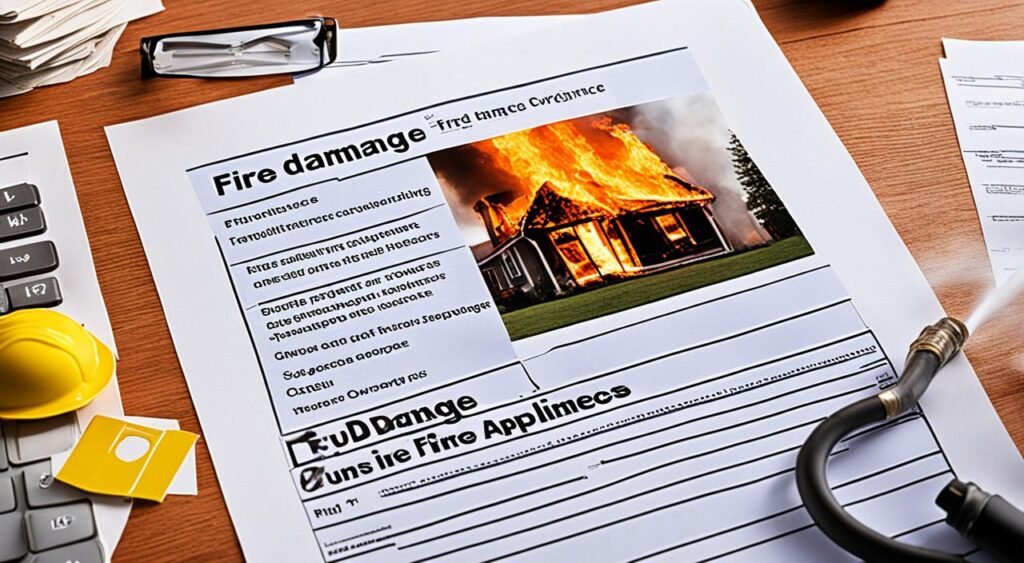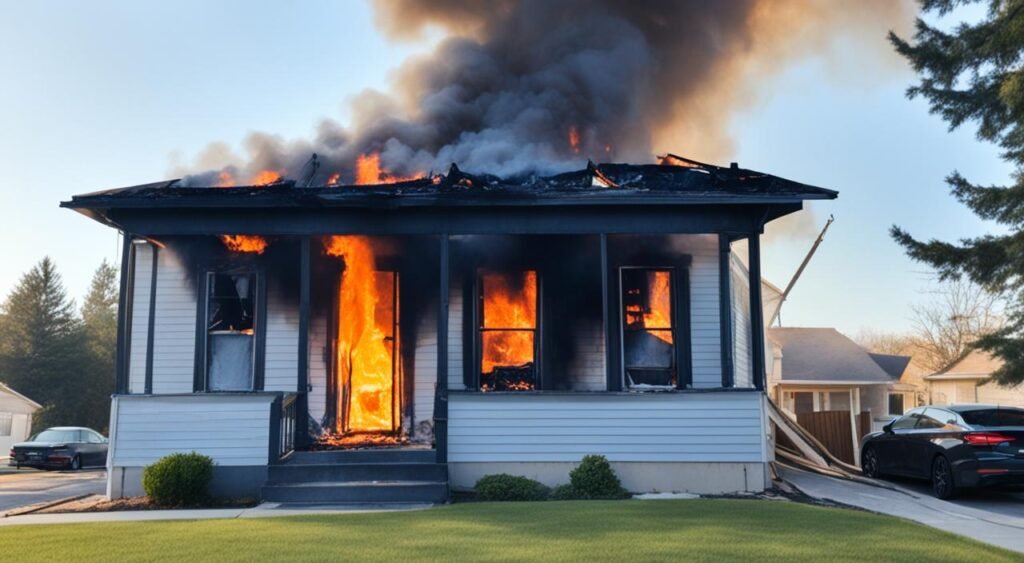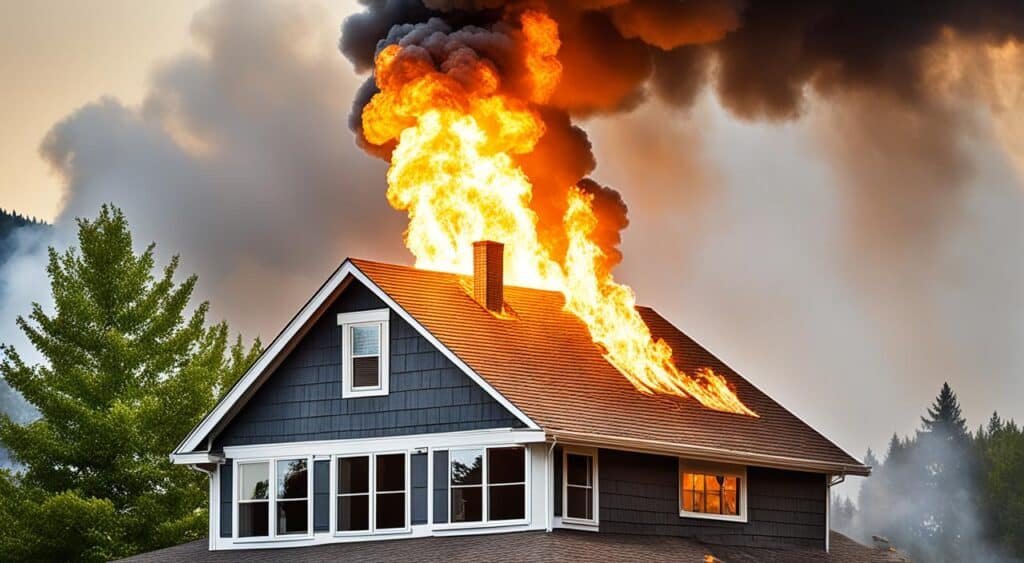Fire insurance keeps homeowners and renters safe from serious money loss due to fires. It’s often included in homeowners insurance, but extra fire insurance might be needed for full protection.
This insurance can help with repairs or rebuilding after a fire. It goes beyond what a normal homeowners insurance would cover. Yet, it might not pay for damage from war, nuclear accidents, or arson.
Typically, homeowners insurance includes fire insurance. It covers the house, personal items, living somewhere else if needed, and liability. But, choosing a separate fire insurance plan gives you more coverage, especially for valuable items.
Key Takeaways
- Fire insurance is a type of property insurance that covers damages and losses caused by fires.
- Most homeowners insurance policies include some level of fire coverage, but homeowners may need additional fire insurance for more comprehensive protection.
- Fire insurance can pay for the replacement, repair, or reconstruction of a property damaged by a fire, beyond the limits of standard homeowners insurance.
- Fire insurance policies typically exclude coverage for certain perils, such as those caused by war, nuclear events, or arson.
- Homeowners may opt for a standalone fire insurance policy to obtain higher coverage limits or more comprehensive protection, especially for high-value or irreplaceable items.
Understanding Fire Insurance
Fire insurance protects homeowners from the financial impacts of fire. It covers damages to their home, belongings, and other costs. The fire insurance policy helps homeowners recover from significant fire damage and losses.
Definition of Fire Insurance
Fire insurance is part of homeowners insurance designed for fire situations. It pays for repairs to your home, replaces items, and covers extra living costs during the fix-up. This coverage ensures homeowners don’t bear the full cost of fire damage.
Purpose of Fire Insurance
The main goal of fire insurance is to financially shield homeowners after a fire. A house fire can ruin your home, items, and force you to live elsewhere. With fire insurance, homeowners get help to cover these losses and get their home back in shape.
Types of Fire Insurance Policies
Different fire insurance policies exist, from basic to comprehensive coverage. Some come with homeowners insurance, while others stand alone. Homeowners can add more protection through additional fire insurance, especially for expensive items not fully covered otherwise.
Coverages Included in Fire Insurance

Fire insurance has key coverage types for homeowners in case of a fire. These include coverage for the dwelling, other structures, personal items, living elsewhere temporarily, and liability.
Dwelling Coverage
For the home’s structure and attached parts like a garage, fire insurance helps pay for repairs. Dwelling coverage protects the main living space, making sure it’s fixed after a fire.
Other Structures Coverage
If a fire damages sheds, fences, or garages, other structures coverage helps pay for repairs. It’s crucial in ensuring the whole property is looked after.
Personal Property Coverage
Fire insurance also covers personal belongings, like furniture and clothes. Personal property coverage helps replace or fix items that are lost or damaged due to a fire.
Additional Living Expenses Coverage
When a home is unsafe to live in, additional living expenses coverage covers costs for living elsewhere. It can pay for temporary housing and extra living costs.
Liability Coverage
Liability coverage in a fire insurance policy protects the homeowner from legal fees and damages. This is if a fire from their property injures others or damages their property.
Fire Insurance and Homeowners Insurance

Fire insurance is a key part of homeowners insurance. It helps cover costs from fire damage to the house, your stuff, and if you have to live somewhere else. Compared to homeowners insurance, which guards against many dangers, fire insurance focuses only on fire losses, no matter where the fire starts.
Relationship Between Fire Insurance and Homeowners Insurance
The bond between fire insurance and homeowners insurance is strong. Fire insurance is vital in a complete homeowners insurance plan. It protects the home and items if a fire occurs. People might add extra fire insurance for better coverage, especially for valuable items not fully protected by their main insurance.
Standard Homeowners Policy Coverage for Fire
Most homeowners insurance covers fire damages. It pays for the house’s repairs, lost items, and helps with living elsewhere because of the fire. Still, extra fire insurance could be smart, especially in fire-prone areas. It’s also good for properties with unique or high-value things.
Fire insurance
Fire insurance helps pay for damage from fires. It covers the cost of fixing or replacing a house and its contents. Knowing how fire insurance works is key for homeowners who want financial help after a fire.
How Fire Insurance Works
It can pay you back in two ways: on a replacement cost or an actual cash value basis. The replacement cost method will pay the full price for new items. The actual cash value way accounts for item depreciation, giving a lower payout.
Replacement Cost vs. Actual Cash Value
The choice of policy affects claim payouts. Replacement cost options make it easier to get higher payouts. But, these might mean paying more in premiums. Policies that use actual cash value are cheaper but offer less payout for items.’
Fire Insurance Claims Process
Filing a fire insurance claim means documenting all losses. You’ll need to work with an adjuster from the insurance company. Also, you must pay any deductibles before getting money. This process helps get back your home and belongings to how they were before the fire, lessening the financial blow.
Understanding fire insurance can help you choose better coverage. It also makes navigating the claims process smoother. This ensures you get the support needed for rebuilding and recovery.
Exclusions and Limitations

While fire insurance offers wide coverage, it has its limits. Homeowners need to be aware of these. It’s crucial to closely examine policy details to know what’s left out.
Fires Not Covered by Fire Insurance
Fire insurance won’t pay for losses from specific fires. This includes fires due to war, nuclear events, or arson. Such severe or deliberate fires are typically not part of standard fire insurance policies.
Negligence and Arson Exclusions
If a fire starts due to the homeowner’s negligence, like not keeping up with the fireplace or wiring, it might not be covered. The same goes if the insurer finds out the fire was set on purpose by the homeowner or someone they live with. Damage from these fires won’t usually be included.
Wildfire Coverage Limitations
For homeowners in areas prone to wildfires, insurance can be tricky to get. Insurers might limit wildfire payouts or want you to buy extra coverage. This can make fire insurance more expensive and harder to find in risky places.
Cost of Fire Insurance

The fire insurance cost changes depending on the house’s location, age, and what it’s made from. Being close to fire hydrants and stations helps lower the cost. So does having a good history of claims and a high credit score in some states.
Factors Affecting Fire Insurance Premiums
Fire insurance prices go up if your home is likely to face natural disasters. Things like wildfires raise the costs. If your house is old or made of materials that easily catch fire, you might pay more. The same goes if you’re far from fire stations or have no nearby fire hydrants.
Average Fire Insurance Costs
The yearly price for a homeowners policy with $350,000 coverage is about $1,582. This includes fire insurance. But, actual average fire insurance prices can change. This depends on where your house is and the coverage you choose. Homeowners can lower costs by picking the right coverage and deductibles.
Purchasing Fire Insurance

When it comes to buying fire insurance, homeowners need to think about the value of their property and possessions. They must figure out how much it would cost to rebuild their home.
This includes adding up the cost of replacing their stuff.
Determining Coverage Needs
For the right fire insurance coverage, homeowners should look at factors like home size and age. They need to value their personal items, including expensive or rare things they own.
Knowing what these things are worth help homeowners pick the best insurance. This could be replacement cost or actual cash value.
Working with Insurance Providers
Talking to insurance experts, whether on their own or with an agent, is key. They guide homeowners through policy types and limits. They also make sure the insurance fits the homeowners’ needs.
Tips for Homeowners
Here are some tips for homeowners to remember:
- Maintain an up-to-date list of personal belongings and their values.
- Know the policy’s do’s and don’ts to prevent any surprise gaps in coverage.
- Think about extra insurance for items that standard fire policies might not fully cover.
By understanding their insurance needs and getting advice from the pros, homeowners protect their property better. Following these tips can ensure they get the right fire insurance.
Fire Safety and Prevention

It’s important for homeowners to follow fire safety methods. Doing this cuts down on the chances of fires and the harm they cause. They should check their smoke alarms, fire extinguishers, and chimneys often. Also, they must be careful with fire risks like candles and cooking gear.
Importance of Fire Safety Measures
Protecting lives and homes with fire safety is key. Good smoke detectors, fire extinguishers, and safe habits make a home safer against fires. These steps warn you early and help you act fast, lowering the need for fire insurance coverage.
Fire Prevention Tips
Homeowners can prevent fires by taking simple steps.
- Check chimneys and fireplaces often.
- Keep flammable things away from heat.
- Unplug unused electrical items.
- Be careful with cooking and candles.
- Store and throw away flammable stuff properly.
Maintaining Proper Fire Insurance Coverage
With the right fire safety and prevention, homeowners should also have good fire insurance coverage. It protects their home and things if there’s a fire. They should check their policies often to avoid any gaps. By focusing on safety, prevention, and good insurance, they can lower the risk and harm of fires.
Filing a Fire Insurance Claim

If a fire harms your home, you need to act fast to file a successful fire insurance claim. The first thing to do is stop more damage. Then, get pictures, videos, and lists of what’s damaged. After that, let your insurance company know to start the claims process.
Steps to File a Fire Insurance Claim
Right after the fire, tell your insurance company. You’ll need to give them details like the fire’s date, time, and how it started. Do what you can to stop more damage, like covering broken windows. It’s very important to have a clear list of what was lost for your fire insurance claim documentation.
Documentation and Evidence Required
You must show the insurance company proof, like receipts and ownership papers. Also, use pictures and videos of the damage and any repair prices. Keeping an updated list of your stuff makes this part easier since you’ll already have a list.
Working with Claims Adjusters
Talking with the claims adjusters from the insurance company is key. They’ll check your property, look over evidence, and decide what they’ll pay. You might have to answer some questions, share more details, or even negotiate the settlement for the best result from your fire insurance policy.
Also Read: Evolutionary Reservoir Engineering Innovations: Pioneering The Future
Conclusion
Fire insurance is vital in home insurance, guarding against the immense costs of fires. Knowing about its coverages, exclusions, and claim steps is key. Homeowners can make sure they’re well protected. Tips like keeping fire safety up and checking insurance regularly cut fire risks. This boosts how much help fire insurance can offer.
Having the right fire insurance brings peace of mind. It means being ready to face a fire’s tough blow. If a fire happens, a good policy helps pay to rebuild or fix your home and things. This way, homeowners can focus on rebuilding their lives.
Choosing fire insurance wisely defends the top asset – your home. It gets you ready for fires’ surprises. The best protection lets you tackle the recovery, coming out stronger. This is why it’s smart to make fire insurance a key part of your home insurance plan.
FAQs
Q: What does fire insurance cover?
A: Fire insurance typically covers damage to your home, belongings destroyed in a fire, and additional living expenses if you can’t stay in your home. It may also provide coverage for rebuilding your home.
Q: Is renters insurance enough to cover fire damage?
A: Renters insurance usually covers your personal belongings but may not cover damage to the structure of the building. It’s essential to review your policy to understand what is covered.
Q: How can I buy fire insurance?
A: You can buy fire insurance through an insurance company, insurance broker, or the California Fair Plan, which offers coverage for properties that are hard to insure.
Q: What is a fair plan in relation to fire insurance?
A: The California Fair Plan is an insurance association that provides coverage to properties that have been denied by traditional insurance companies. It is overseen by the state’s Department of Insurance.
Q: Will auto insurance cover fire damage to my car?
A: Auto insurance may provide coverage for fire caused damage to your car. Check with your insurer to understand the specific coverage options available to you.
Q: What should I do if my home is damaged in a fire?
A: If your home is damaged in a fire, you should contact your insurance company to file a claim. The insurance company will assess the damage and pay for the repairs as per your policy.
Q: What factors can impact the coverage of fire insurance?
A: The cause of the fire, the type of policy you have, and the coverage options chosen can all impact what fire insurance will cover. It’s important to review your policy to ensure you have enough coverage.
Source Links
- https://www.investopedia.com/terms/f/fire-insurance.asp
- https://www.forbes.com/advisor/homeowners-insurance/fire-insurance/
- https://www.usnews.com/insurance/glossary/fire-insurance

